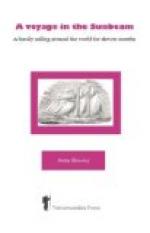We were indeed glad to dismount after our weary ride, and rest in the comfortable rocking-chairs under the verandah. It is a small white wooden building, overhung with orange-trees, with a pond full of ducks and geese outside it, and a few scattered outbuildings, including a cooking hut, close by. A good-looking man was busy broiling beef-steaks, stewing chickens, and boiling taro, and we had soon a plentiful repast set before us, with the very weakest of weak tea as a beverage. The woman of the house, which contained some finely worked mats and clean-looking beds, showed us some tappa cloth, together with the mallets and other instruments used in its manufacture, and a beautiful orange-coloured lei, or feather necklace, which she had made herself. The cloth and mallets were for sale, but no inducement would persuade her to part with the necklace. It was the first she had ever made, and I was afterwards told that the natives are superstitiously careful to preserve the first specimen of their handiwork, of whatever kind it may be.
A woman dressed in a pink holoku and a light green apron had followed us hither from the cottages we had first stopped at, and I noticed at the time that, though she was chatting and laughing with a female companion, she did not seem very well. Whilst we were at lunch a sudden increase to her family took place, and before we were ready to start I paid her and her infant a visit. She was then sitting up, apparently as well as ever, and seemed to look upon the recent event as a very light matter.
Directly we had finished our meal—about three o’clock—the guide came and tried to persuade us that, as the baggage-mules had not yet arrived, it would be too late for us to go on to-day, and that we had better spend the night where we were, and start early in the morning. We did not, however, approve of this arrangement, so the horses were saddled, and, leaving word that the baggage-mules were to follow on as soon as possible, we mounted, and set off for the ‘Volcano House.’ We had not gone far before we were again overtaken by a shower, which once more drenched us to the skin.
The scene was certainly one of extreme beauty. The moon was hidden by a cloud, and the prospect lighted only by the red glare of the volcano, which hovered before and above us like the Israelites’ pillar of fire, giving us hopes of a splendid spectacle when we should at last reach the long-wished-for crater. Presently the moon shone forth again, and gleamed and glistened on the rain-drops and silver-grasses till they looked like fireflies and glowworms. At last, becoming impatient, we proceeded slowly on our way, until we met a man on horseback, who hailed us in a cheery voice with an unmistakable American accent. It was the landlord of the ‘Volcano House,’ Mr. Kane, who, fearing from the delay that we had met with some mishap, had started to look for us. He explained that he thought it was only




